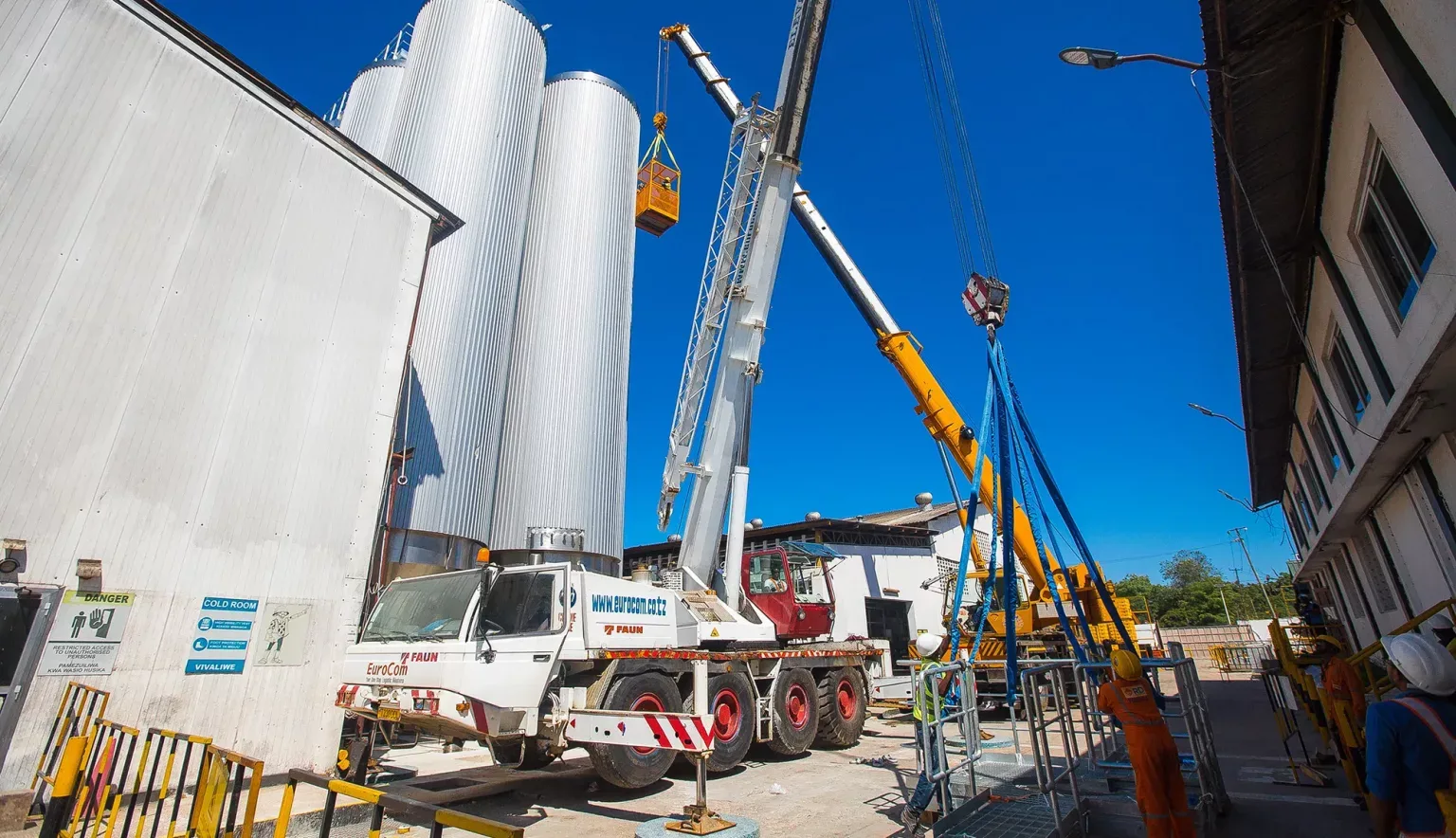Serengeti Breweries continues to produce and distribute market-leading beers and spirits across Tanzania, its sustained growth providing opportunities to invest in people and planet.
THE PRIDE OF TANZANIA
Of all the alcoholic beverages in the world, beer, it is safe to say, has truly stood the test of time.
It is the oldest recorded recipe in the world, the Ancient Egyptians documenting brews with ingredients such as dates, pomegranates and indigenous herbs around 5,000 BC.
Harsh sounding by today’s standards, these ancient beer recipes have evolved into what is now a metropolis of variety accentuated by the rise of breweries and brands the world over. From porters and pilsners to wheat and rye, it is arguably the most diverse beverage category of modern times.
And while beer’s origins can be traced back to Africa, the continent today is home to many thriving beverage markets, including Tanzania.
“Tanzania has enjoyed good sustained economic growth for over 15 years, averaging over seven percent annual GDP increases along with a high population growth rate,” comments Mark Ocitti, Managing Director of leading Tanzanian brewer and beverage distributor Serengeti Breweries Limited (SBL).
“The country has also undertaken major reforms to improve the business environment. All these have contributed to the expansion of the country’s alcohol market over the years, with beer companies becoming among the leading taxpayers in the country.
“We are optimistic that Tanzania’s business environment will continue to improve even further once the government fully implements its blueprint, which entails undertaking a number of policy reforms around taxation, bureaucracy and other non-tariff barriers to trade.”
If a company is well-placed to comment on the health of Tanzania’s beverage industry, it is SBL.
Incorporated in 1988 as Associated Breweries, it stands today as a major player in the beer industry of the country, its brands (which also include spirits) are readily available nationwide.
The year 2002 saw the change in name to SBL. In 2010 Diageo, under its East Africa Breweries Limited business, bought a majority stake in the organisation.
“This acquisition prompted increased investment in international quality standards, leading to increased job opportunities for the people of Tanzania and more revenue contribution to the government,” Ocitti adds. “The company currently employs over 700 staff both directly and indirectly. Further, we source 70 percent of our beer raw materials from a network of 400 local farmers – growers of barley, sorghum and maize.”
Such produce makes its way to one of three SBL breweries in Tanzania, located in Dar es Salaam, Mwanza and Moshi. Here the company brews all its beers including Serengeti Lite, which was recently recognised with a Superbrand Award and is testament to the quality that Tanzania is able to produce.
This is where John Wanyancha, Corporate Relations Director, joins the conversation.
Immediately asked whether he enjoys a beer, and if he has a preferred tipple, he responds: “Yes I do, and my favourite beer brand is Serengeti Premium Lager, the first local Tanzanian beer brand to be made of 100 percent malt.
“Serengeti Premium Lager is the flagship brand for Serengeti Breweries, first brewed in 1996. A multiple Gold winner of the International Monde Selection Award, it is a combination of local heritage and craftmanship – brewed by a truly Tanzanian brew master.
“Just like or national park, Serengeti Premium Lager is the Pride of Tanzania and celebrates our country and the diversity of our people. Serengeti Premium Lager is also the Proud Sponsor of the Taifa Stars, the Tanzanian national football team.”
“We are optimistic that Tanzania’s business environment will continue to improve even further once the government fully implements its blueprint, which entails undertaking a number of policy reforms around taxation, bureaucracy and other non-tariff barriers to trade”
Mark Ocitti, Managing Director, Serengeti Breweries
RISING TO THE CHALLENGE
As well as its own beers, SBL houses other leading beers such as Pilsner Lager, Tusker Lager, Kibo Gold, and Guinness stout. Owing to its association with Diageo, the company is also home to some of the world’s most renowned spirits such as Johnnie Walker whisky, Smirnoff Vodka, Gordon’s gin, Captain Morgan rum and Baileys Irish cream.
This sustained portfolio growth since global beverage giant Diageo invested in 2010 has helped SBL remain relevant in a market whose consumers are adopting ever-changing tastes.
However, opportunities to explore different beers and spirits have been drastically limited throughout much of 2020, not least because the COVID-19 pandemic has caused the closure of many bars and social venues where alcohol is dispensed.
“Coronavirus has negatively impacted the alcohol industry in many ways,” Wanyancha says. “As a result of its required prevention measures, which include social distancing, customers can no longer congregate in large numbers in bars and other forms of outlets, thereby restricting sales volumes.
“As a result of this requirement, our company has been forced to change its ways of working and placing substantial investment into provision of safety equipment for those working in production facilities and executing sales and other field activities.”
Despite the obvious and immediate disruption, SBL stood up to the challenge and thrust itself into the national fight against the virus.
Ocitti adds: “Upon confirmation of the first case of COVID-19 in Tanzania in March this year, SBL quickly came forward to partner with the government in a countrywide awareness creation exercise.
“We helped the Ministry of Health deliver posters and COVID-19 information leaflets to every regional headquarters countrywide. This was followed in April by donating sanitisers in Dar es Salaam, for distribution to the wider Tanzanian community.
“We are delighted that this joint response to the pandemic by both government and private stakeholders has yielded positive results, and the country was recently endorsed by, among others, the World Travel and Tourism Council.”
Indeed, the challenges presented by the coronavirus outbreak have had an impact on SBL’s own growth ambitions, but the company continues to invest in view of brighter future.
In 2020, the company concluded a £10 million expansion of its brewery in Dar es Salaam, a vital addition of capacity which will enable it to cater to increasing demands for its products.
At the site in Moshi, nestled in the northeastern region of Tanzania, SBL is currently expanding its production facilities in an investment worth £4.5 million, with the third brewery in Mwanza (on the shore of Lake Victoria) also set for expansion.
The result of this phased growth plan, as well as the much-needed capacity gain, will generate socioeconomic development in these areas through the creation of additional job opportunities and additional business for raw materials suppliers.
Indeed, the Managing Director is quick to point out the vital role that farmers and other suppliers play in SBL’s ongoing operations.
“SBL’s value chain comprises of many players,” Ocitti says. “From upstream, the company sources grain from over 400 farmers located across eight regions. The grain, which include barley, maize and sorghum, are transported by third parties into SBL and other offsite facilities for storage and primary processing. SBL also sources many other ingredients from local and overseas suppliers that go into beer production.
“Downstream, SBL partners with hundreds of distributors and transporters to deliver its products to every corner of the country where, again, the company relies on thousands of outlets to get its product to the consumers.”
INVESTING IN THE PEOPLE AND THE PLANET
This comprehensive network spread across the length and breadth of Tanzania is central to SBL’s ambition to become the best performing, most trusted and respected consumer products company in the country.
Wanyancha cites its scale, geographical footprint and innate desire to continuously improve as indicators that the business is already well-placed to reach this objective.
“For this reason, SBL is continuously investing on empowering its staff through regular training, providing them with the best work environment and investing on modernising our operational processes,” he says proudly.
“Serengeti Breweries is an employer of choice in Tanzania’s job market due to its competitive employment terms. The company offers a six-month maternity leave to female employees compared to the three-month statutory leave.
“Further, we have a graduate programme that nurtures and develops budding employees to higher roles in the organisation. We also run a women empowerment and mentorship initiative known as Spirited Women, that enables female employees to grow their careers into senior leadership positions.”
As well its own people, SBL is channeling more investment into social projects and environmental preservation activities.
It functions in the belief that its business cannot thrive outside of the wellbeing of the communities in which it operates, be they farmers or local Tanzanians who consume the various products.
For example, SBL runs a programme to develop and empower its 400 supplier farmers, growers of sorghum, barley and maize which are spread through eight different regions. Another education-driven initiative takes the form of a scholarship scheme that provides 40 fully-funded agri-related qualifications for local students every year, the aim being to build further technical competencies among its farming network.
Another critical aspect of community wellbeing is road safety. Here, SBL reaches out to thousands of its customers and the general public including drivers, college students, bodaboda riders (motorcyclists), bus drivers and pedestrians with don’t drink and drive messages. This, according to the Tanzanian police, has contributed to improving road safety.
SBL also recognises the need to safeguard the environment and natural resources, especially water, this being the second major component of its CSR strategy.
Not only does the company plant thousands of trees each year to conserve water catchment areas, it also drives Diageo’s Water of Life scheme in Tanzania.
“Since 2010, SBL has undertaken 18 water projects across the country, benefitting over 300,000 Tanzanians by providing them with free, clean and safe water,” Ocitti says.
Diageo’s strong record in water stewardship and the Water of Life programme has brought water and sanitation to around 10 million people in 18 countries over the last 10 years. The aim is for the Water for Life initiative to be self-funded by local Diageo businesses, rather than being supported from the company head office, and SBL has been a keen contributor.
Further, in 2015 Diageo and SBL implemented the Alliance for Water Stewardship (AWS) Standard at their Moshi brewery. AWS is a global partnership dedicated to promoting the responsible use of freshwater, through a water stewardship system that drives and recognises improved water management practices.
Such endeavours will not only help to make SBL’s operations more environmentally friendly, but also more economical, a trend which will enable it to build on the success already achieved since setting up in 1988.
Renowned for supplying quality to the market, it is very much this message that the Managing Director presents when looking ahead to the future of the company and the next chapter in its exciting development.
Ocitti concludes the conversation optimistically: “Going forward, SBL remains committed to meeting the changing consumer tastes through innovation. Innovation and quality remain at the heart of our business.
“We have and will continue to consistently introduce new products into our portfolio to meet the emerging tastes and needs of our customers. This will happen hand in hand with a strong focus on quality as key to all SBL activities. We believe this is the reason that all our beer and spirit brands have won different awards locally and internationally. The Superbrand Award for Serengeti Lite, for instance, is one of the many brand quality recognitions we have.
“We want to reassure our customers and other business stakeholders that SBL remains determined to continue producing high quality products in line with international standards.”































